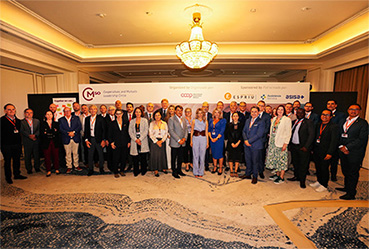The International Cooperative Alliance (ICA) convened on May 20–21 in Madrid for the first in-person meeting of the ‘Cooperatives and Mutuals’ Leadership Circle – CM50. This group, launched earlier this year by the ICA, aims to foster growth and innovation in cooperatives and mutuals around the globe and to advocate for national government commitments to support and expand these enterprises.
The Madrid meeting was held in collaboration with the Espriu Foundation, Assistència Sanitària, and the ASISA Group, and featured the participation of Spain’s Second Deputy Prime Minister and Minister of Labour and Social Economy, Yolanda Díaz, who delivered the event’s closing remarks. In her speech, she stated: “Cooperativism is a transformative force that goes beyond the economic sphere and can address the climate, geopolitical, and social challenges we face.” For Díaz, given today’s global crises—wars and climate emergencies—the answer is “more cooperativism and more social economy, not to replace traditional economics but to compete on equal terms.”
During the meeting, CM50 members defined key strategies for political advocacy and drafted a manifesto for the upcoming World Social Summit, to be held in Doha this November. They also celebrated 2025 as the International Year of Cooperatives and planned activities for the 2026–2030 strategic period, setting out a long-term roadmap for cooperative and mutual engagement beyond 2030.
Many of the enterprises represented in the CM50 appear in the ‘World Cooperative Monitor’, which lists the 300 largest cooperative and mutual enterprises worldwide. This publication has been produced annually since 2012 by the ICA and Euricse. These organizations represent various sectors, including agriculture, finance, engineering, housing, technology, retail, and health, and hail from across the globe.
An International Group with Thousands of Opportunities
During his remarks in Madrid, ICA Director General Jeroen Douglas reminded attendees that one of the cooperatives’ main goals is “to accelerate the achievement of the United Nations Sustainable Development Goals (SDGs).”
In a world facing broad social, economic, and political challenges, he said, “it is vital that cooperatives work together to demonstrate the impact we can achieve.”
“Through CM50, we not only showcase our capacity to drive a more sustainable future, but we also highlight how our organizations, as models of best business practices, can transform society and increase the market share of cooperatives—contributing, in turn, to building a better world,” he said.
Carlos Zarco, President of the International Health Cooperative Organization (IHCO)—a sectoral organization of the ICA and host of the CM50 meeting in Madrid—stated that as collectively owned and socially driven enterprises, “cooperatives are uniquely equipped to address today’s global challenges and promote inclusive, sustainable development. The Doha World Social Summit is a key opportunity for governments to support this potential by implementing policies that place cooperatives at the heart of the 2030 Agenda.”
Shirine Khoury-Haq, CEO of Co-op, the UK’s largest consumer cooperative, emphasized that the unique power of the cooperative movement “lies in being a global network with 3 million cooperatives and 1.2 billion members worldwide, working to create value for our members.”
“This global network also gives cooperatives the opportunity to apply Principle 6 and make a difference on the global stage. Cooperation among cooperatives is our movement’s superpower,” affirmed Khoury-Haq. She concluded her speech by stating: “We haven’t always fully tapped into this principle, which is why I’m so excited about CM50’s potential. It brings together many of our movement’s leaders with a clear and ambitious purpose: to make a real impact for our members and their communities around the world.”







